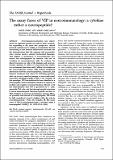Por favor, use este identificador para citar o enlazar a este item:
http://hdl.handle.net/10261/9350COMPARTIR / EXPORTAR:
 SHARE SHARE
 CORE
BASE CORE
BASE
|
|
| Visualizar otros formatos: MARC | Dublin Core | RDF | ORE | MODS | METS | DIDL | DATACITE | |

| Campo DC | Valor | Lengua/Idioma |
|---|---|---|
| dc.contributor.author | Pozo Pérez, David | - |
| dc.contributor.author | Delgado, M. | - |
| dc.date.accessioned | 2008-12-25T11:26:59Z | - |
| dc.date.available | 2008-12-25T11:26:59Z | - |
| dc.date.issued | 2004-09 | - |
| dc.identifier.citation | The FASEB Journal 18: 1325-1334 (2004) | en_US |
| dc.identifier.issn | 0892-6638 | - |
| dc.identifier.uri | http://hdl.handle.net/10261/9350 | - |
| dc.description | 10 pages, 3 figures.-- PMID: 15333575 [PubMed]. | en_US |
| dc.description.abstract | Neuroimmunomodulation has experienced an explosive growth not only in basic research, but expanding to the point that prospective clinical research could be now a reality. A crucial factor for the functioning of this intimate bidirectional network was the demonstration that the immune and neuroendocrine systems speak a mutual biochemical language. This implies 1) production of neuroendocrine hormones and neuropeptides by immune cells and of cytokines by neuroendocrine cells; 2) evidence for shared receptors on cells of the immune and neuroendocrine systems; 3) effect of neuroendocrine mediators on immune functions; and 4) effect of cytokines on the neuroendocrine system. This reduces traditional differences between neurotransmitters, hormones, and immune mediators and raises the following question: what can we now regard as immune or neuroendocrine? Vasoactive intestinal peptide (VIP) is one example of this paradigm. VIP has traditionally been classified as a neuropeptide/neurotransmitter based in its capacity to mediate and regulate neuronal functions. Recent work has demonstrated that VIP is produced by T cells, especially Th2 cells, and that through specific receptors it exerts immunological functions typically ascribed to Th2 cytokines in nervous and immune systems. Here, we postulate that instead of a neuropeptide, VIP could be fully considered a type 2 cytokine with a key role in neuroimmunology. | en_US |
| dc.description.sponsorship | This study was supported by extramural grants from the Instituto de Salud Carlos III, Fondo de Investigacion Sanitaria, Spanish Ministry of Health (PI 030359 to D.P and PI 030526 to M.D.), from La Caixa Foundation (NE-03-009 to M.D) and from the European Union 6th Framework Grants Program (FP6-006380 to D.P). | en_US |
| dc.format.extent | 2210831 bytes | - |
| dc.format.mimetype | application/pdf | - |
| dc.language.iso | eng | en_US |
| dc.publisher | Federation of American Societies for Experimental Biology | en_US |
| dc.rights | openAccess | en_US |
| dc.subject | Immune response | en_US |
| dc.subject | Autoimmunity | en_US |
| dc.subject | Th cells | en_US |
| dc.subject | Vasoactive intestinal peptide | en_US |
| dc.title | The many faces of VIP in neuroimmunology: a cytokine rather a neuropeptide? | en_US |
| dc.type | artículo | en_US |
| dc.identifier.doi | 10.1096/fj.03-1440hyp | - |
| dc.description.peerreviewed | Peer reviewed | en_US |
| dc.relation.publisherversion | http://dx.doi.org/10.1096/fj.03-1440hyp | en_US |
| dc.type.coar | http://purl.org/coar/resource_type/c_6501 | es_ES |
| item.openairecristype | http://purl.org/coar/resource_type/c_18cf | - |
| item.fulltext | With Fulltext | - |
| item.cerifentitytype | Publications | - |
| item.openairetype | artículo | - |
| item.languageiso639-1 | en | - |
| item.grantfulltext | open | - |
| Aparece en las colecciones: | (IPBLN) Artículos | |
Ficheros en este ítem:
| Fichero | Descripción | Tamaño | Formato | |
|---|---|---|---|---|
| Pozo_Delgado_FASEB_Journal_2004.pdf | 2,16 MB | Adobe PDF |  Visualizar/Abrir |
CORE Recommender
SCOPUSTM
Citations
80
checked on 31-mar-2024
WEB OF SCIENCETM
Citations
73
checked on 27-feb-2024
Page view(s)
368
checked on 18-abr-2024
Download(s)
401
checked on 18-abr-2024
Google ScholarTM
Check
Altmetric
Altmetric
NOTA: Los ítems de Digital.CSIC están protegidos por copyright, con todos los derechos reservados, a menos que se indique lo contrario.
